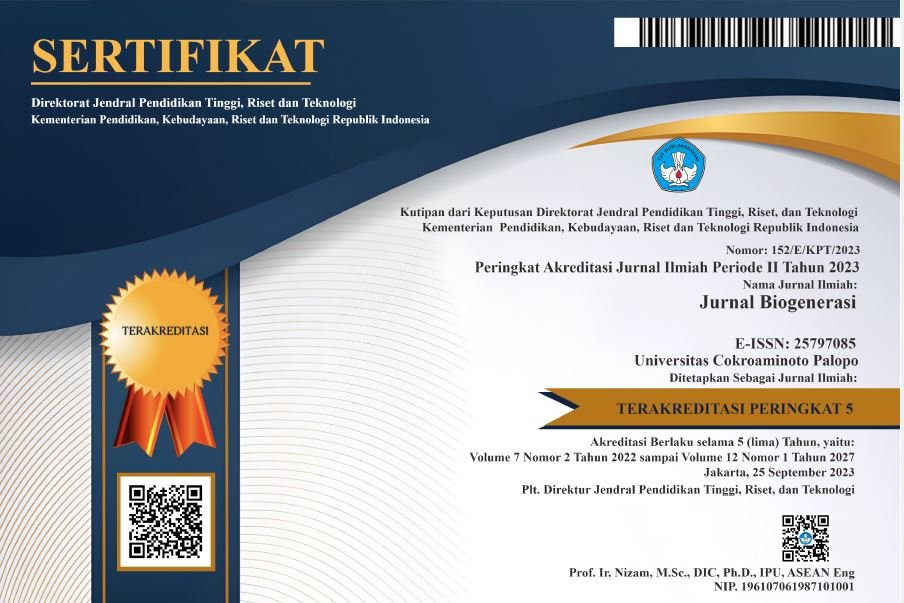PENGEMBANGAN E-MODUL BERBASIS PROBLEM BASED LEARNING PADA MATERI SISTEM PENCERNAAN MANUSIA
DOI:
https://doi.org/10.30605/biogenerasi.v10i3.6890Keywords:
E-Module, Problem Based Learning (PBL), digestive system, practicality, development of teaching materialsAbstract
This study aims to develop a Problem-Based Learning (PBL)-based e-module on the human digestive system and determine its practicality. This research is a research and development (R&D) study using the ADDIE model, which consists of five stages: Analysis, Design, Development, Implementation, and Evaluation. The developed e-module was validated by two expert validators and tested for practicality by teachers and 11th-grade students of SMA YAPIP Makassar. The validation results showed that the e-module was categorized as very valid, with percentages of 93% and 98%, respectively. The practicality test results for teachers were 87% (practical category), and for students, 83% (practical category). This e-module incorporates PBL learning syntax, is complemented by images, videos, a glossary, and an assessment rubric, and is flexibly accessible to both teachers and students. Based on these results, it can be concluded that the developed PBL-based e-module on the human digestive system is practical and suitable for use in the learning process.
Downloads
References
Alisa H. Kadir, N., Mardin, H., M. Hasan, A., Wahyuni K. Baderan, D., Nusantari, E., S. Hamidun, M., & H. Husain, I. (2024). Pengembangan E-Modul Berbasis Problem Based Learning (Pbl) Berbantuan Aplikasi Canva Pada Materi Perubahan Lingkungan Kelas X Di SMA Negeri 1 Telaga Biru. Jurnal Biogenerasi, 10(1), 203–2011. https://doi.org/10.30605/biogenerasi.v10i1.4533
Amel, A. M., & Miterianifa, M. (2024). Perkembangan Society 5.0 Pada Pendidikan Ipa Di Indonesia. Jurnal Education and, Development.2(1), 164–167.
Ardianti, R., Sujarwanto, E., & Surahman, E. (2022). Problem-based Learning: Apa dan Bagaimana. Diffraction, 3(1), 27–35. https://doi.org/10.37058/diffraction.v3i1.4416
Azura, A., Pramuda, A., & Sari, M. (2025). Pengembangan e-modul berbasis Problem Based Learning (PBL) pada materi sistem pencernaan manusia terhadap kemampuan berpikir kritis siswa kelas XI SMA Santun Untan Pontianak. IBEJ : Innovative Biology Education Journal, 01(05), 38–45. https://jurnal.mipatek.uppgripnk.ac.id/index.php/IBEJ
Hafizah, M., Sukmono, T., & M.Haris Efendi Hsb. (2024). Pengembangan E-Modul Berbasis Problem Based Learning Pada Materi Sistem Pencernaan Manusia Untuk Meningkatkan Kemampuan Berfikir Kreatif Peserta Didik Kelas XI IPA SMA. Inspiratif Pendidikan, 12(2), 625–639. https://doi.org/10.24252/ip.v12i2.37516
Lastri, Y. (2023). Pengembangan Dan Pemanfaatan Bahan Ajar E-Modul Dalam Proses Pembelajaran. Jurnal Citra Pendidikan, 3(3), 1139–1146. https://doi.org/10.38048/jcp.v3i3.1914
Nuriadila, N., Hendri, W., Azrita, A., & Sari, R. T. (2022). Pengembangan modul biologi berbasis problem solving pada materi sistem eksresi kelas xi ipa sma. Bio-Pedagogi, 10(2), 82. https://doi.org/10.20961/bio-pedagogi.v10i2.55859
Selaturrohmi, S., & Haikal, M. (2024). Validitas Modul Sistem Pencernaan Manusia Berbasis Problem Based Learning di MA Sirojut Tholibin Taman Sari Pamekasan. Journal of Authentic Research, 3(1), 1–9. https://doi.org/10.36312/jar.v3i1.1477
Souwakil, H., Jamdin, Z., Marda, N. (2024). Penerapan Problem Based Learning (PBL) dalam Meningkatkan Hasil Belajar Kognitif Siswa pada Materi Sistem Pencernaan Pada Manusia. Islamic Natural Science Education Journal. 3(1), 27–34.
Tika, S., & Andi, B. enriawaru. (2023). Analisis Kesulitan Belajar Siswa pada Materi Sistem Pencernaan pada Manusia di Kelas VIII MTs Negeri 1 Pontianak. Jurnal Pendidikan Dan Pembelajaran Khatulistiwa, 12(2), 223–238. https://jurnal.untan.ac.id/index.php/jpdpb/article/view/61827
Usman, N. F. (2021). Literature Review: Pengaruh Penggunaan Bahan AjarE-Modul Dalam Pembelajaran Biologi Di Sma. Seminar Nasional Biologi Dan Sains (SemBioSis) 3 Jurusan Biologi Universitas Negeri Gorontalo , 21(1), 33–54.
Waruwu, M. (2024). Metode Penelitian dan Pengembangan (R&D): Konsep, Jenis, Tahapan dan Kelebihan. Jurnal Ilmiah Profesi Pendidikan, 9(2), 1220–1230. https://doi.org/10.29303/jipp.v9i2.2141
Waruwu, R., Anas, N., & Rohani, R. (2022). Pengembangan E-Modul Berbasis Problem Based Learning pada Materi Sistem Pernapasan untuk Meningkatkan Hasil Belajar Kognitif Siswa SMP. Bioscientist : Jurnal Ilmiah Biologi, 10(2), 1054. https://doi.org/10.33394/bioscientist.v10i2.6295
Zhafirah, T., Erna, M., & Rery, R. U. (2020). Development of E-Module Based on Problem Based Learning (Pbl) in Hydrocarbon Material. AL-ISHLAH: Jurnal Pendidikan, 12(2), 216–229. https://doi.org/10.35445/alishlah.v12i2.263
Downloads
Published
How to Cite
Issue
Section
License
Copyright (c) 2025 Mutmainna, Riza Sativani Hayati, Hilmi Hambali

This work is licensed under a Creative Commons Attribution 4.0 International License.
In submitting the manuscript to the journal, the authors certify that:
- They are authorized by their co-authors to enter into these arrangements.
- The work described has not been formally published before, except in the form of an abstract or as part of a published lecture, review, thesis, or overlay journal.
- That it is not under consideration for publication elsewhere,
- That its publication has been approved by all the author(s) and by the responsible authorities – tacitly or explicitly – of the institutes where the work has been carried out.
- They secure the right to reproduce any material that has already been published or copyrighted elsewhere.
- They agree to the following license and copyright agreement.
License and Copyright Agreement
Authors who publish with this journal agree to the following terms:
- Authors retain copyright and grant the journal right of first publication with the work simultaneously licensed under Creative Commons Attribution License (CC BY 4.0) that allows others to share the work with an acknowledgment of the work's authorship and initial publication in this journal.
- Authors are able to enter into separate, additional contractual arrangements for the non-exclusive distribution of the journal's published version of the work (e.g., post it to an institutional repository or publish it in a book), with an acknowledgment of its initial publication in this journal.
- Authors are permitted and encouraged to post their work online (e.g., in institutional repositories or on their website) prior to and during the submission process, as it can lead to productive exchanges, as well as earlier and greater citation of published work.


.png)

